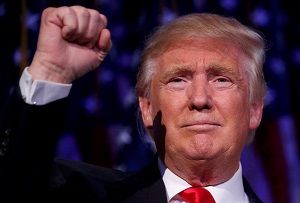The corporate Kangaroo market may become a casualty of the Trump administration’s “America First” agenda, as the prospect of huge corporate tax cuts undermines the case for US companies to sell bonds offshore.
While investor diversification is often cited as a primary driver of the appetite of US companies for overseas bond issues, the obvious incentive for many cash-rich corporate giants is to avoid paying high US corporate tax rates levied on repatriated overseas profits.
One way to avoid these high tax rates is to keep profits offshore, issue bonds in foreign currencies and swap proceeds back into US dollars to help pay dividends and finance buybacks.
With the White House set to use a carrot-and-stick approach to bring back corporate America’s overseas cash piles, the appetite of US companies for bond issuance is bound to decline, especially in peripheral markets beyond the deep US dollar and euro arenas.
“The corporate Kangaroo market faces a double whammy if Trump’s initiatives trigger a large-scale repatriation of profits,” said one Sydney-based origination manager. “Not only will US companies have vastly reduced funding requirements, they will also slash their own purchases of corporate bonds, which have surged to around 15% in typical allocations from next to nothing five years ago.”
Apple has been at the forefront of the offshore bond strategy, having issued in euros, yen, sterling, Swiss francs and Australian dollars, as well as US dollars in the Formosa market, over the past two years.
“The corporate Kangaroo market faces a double whammy if Trump’s initiatives trigger a large-scale repatriation of profits”
The world’s largest company in market capitalisation terms led the upturn in corporate Kangaroo supply with a jumbo maiden A$2.25bn (US$1.6bn) three-tranche sale (via four and seven-year tranches) in August 2015. This set the template for subsequent corporate Kangaroo trades.
Before Apple’s arrival, much smaller deals were the norm. The size of deals that seemed possible – a small number of Kangaroos from BP and Total raised up to A$500m, or US$380m equivalent, from single-tranche five-year issues – was insufficient to tempt many global issuers to head Down Under.
But after Apple’s deals shifted the goal posts so dramatically, others followed suit.
US chipmaker Intel sold a A$800m Kangaroo debut in November 2015 at tenors of four and seven years for a slightly underwhelming outcome largely blamed on the weak market backdrop at that time.
Coca-Cola subsequently confirmed that larger Kangaroos were available with a A$1bn print last June, while in the same week Apple returned to Australia for A$1.425bn three-piece issue, which included a reverse-enquiry driven 10-year deal.
SLASHING US CORPORATE TAX
The Trump administration is looking to reset the playing field. The new president called for a massive federal corporate tax cut to 15% from 35% during his election campaign, along with a one-off 10% tax for companies’ repatriated overseas profits.
The argument for big reductions in the high, albeit avoidable, US corporate taxes looks compelling, with the country having the highest marginal rate among the 35 OECD member countries at 38.9% (federal plus state), alongside one of the worst records in terms of generating revenue at 2.2% of GDP in 2015, according to OECD data.
Japan’s corporate tax rate is 30%, but lower avoidance means its related take represents over 4.3% of Japanese GDP, almost double the US share.
Britain’s corporate tax revenue as a percentage of GDP, at 2.5%, was also higher than the US in 2015, despite having a 20% rate, while Swedish companies paid 3% of the country’s GDP in taxes on a 22% corporate tax rate. Australia’s 30% corporate tax rate delivered 4.7% of GDP to state coffers in 2014.
Trump’s threat to levy a “very major” border tax on entities moving offshore and exporting back to the US suggests other tax and tariff impositions may be on the cards for US companies that do not follow his new patriotic rule book and keep foreign profits overseas.
Domestic issuers could potentially benefit from any slowdown in corporate Kangaroos, as foreign issuers would no longer crowd them out.
However, no major upturn is foreseen as Australian companies remain very well served with competitive bank lending levels at home and the deep euro and US 144A/private placement bond markets overseas.
